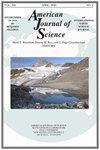Paleoaltimetry of the Western Andes in Northern Chile (∼18.5–19.5°S)
IF 2.5
3区 地球科学
Q3 GEOSCIENCES, MULTIDISCIPLINARY
引用次数: 3
Abstract
Establishing the timing of surface uplift in the Central Andes is essential for evaluating the geodynamic mechanisms responsible for mountain building and their role in the development of dry conditions along the western coasts of Peru and Chile. Here, we present new stable hydrogen isotopic values from stream waters and hydration water in volcanic glass from northern Chile (18.5–19.5°S) that show that the Western Cordillera was already elevated by the early Miocene. The hydrogen isotopic values of reconstructed surface waters obtained from ancient and modern volcanic glass indicate that the Western Cordillera in northern Chile attained modern elevations by at least 22.8 Ma. When combined with paleoaltimetric records from the Altiplano and northwestern Puna, these results demonstrate that surface uplift of the Andean plateau was a time-transgressive process that varied not just from west to east but also from north and south along the strike of the orogen. Our paleoaltimetry reconstruction also suggests that the Western Cordillera has blocked moisture coming from the east since at least the early Miocene, consistent with previously published evidence of arid-semiarid conditions in the Atacama Desert. However, hyperaridity on the western Andean slope developed later and appears to correspond with the timing of uplift in the Eastern Cordillera and Altiplano. Our results suggest that the growth of the Central Andean rain shadow relied not only on the elevation of the Western Cordillera but also on the widening of the plateau.智利北部西安第斯山脉的古高程测量(~ 18.5-19.5°S)
确定安第斯山脉中部地表隆起的时间对于评估造成造山的地球动力机制及其在秘鲁和智利西海岸干燥条件发展中的作用至关重要。在此,我们从智利北部(18.5-19.5°S)火山玻璃的溪流水和水化水中获得了新的稳定氢同位素值,表明西科迪勒拉在中新世早期已经升高。古、现代火山玻璃重建的地表水氢同位素值表明,智利北部西科迪勒拉至少在22.8 Ma之前达到现代海拔高度。当与Altiplano和Puna西北部的古高程记录相结合时,这些结果表明安第斯高原的表面隆起是一个时间海侵过程,不仅从西到东,而且沿着造山带的走向从北向南变化。我们的古测高重建还表明,至少从中新世早期开始,西科迪勒拉就阻挡了来自东部的水分,这与之前发表的阿塔卡马沙漠干旱-半干旱条件的证据一致。然而,安第斯山脉西坡的极度干旱发展较晚,似乎与东部科迪勒拉和高原的隆升时间一致。我们的研究结果表明,安第斯中部雨影的生长不仅依赖于西部科迪勒拉的海拔高度,而且还依赖于高原的拓宽。
本文章由计算机程序翻译,如有差异,请以英文原文为准。
求助全文
约1分钟内获得全文
求助全文
来源期刊

American Journal of Science
地学-地球科学综合
CiteScore
5.80
自引率
3.40%
发文量
17
审稿时长
>12 weeks
期刊介绍:
The American Journal of Science (AJS), founded in 1818 by Benjamin Silliman, is the oldest scientific journal in the United States that has been published continuously. The Journal is devoted to geology and related sciences and publishes articles from around the world presenting results of major research from all earth sciences. Readers are primarily earth scientists in academia and government institutions.
 求助内容:
求助内容: 应助结果提醒方式:
应助结果提醒方式:


